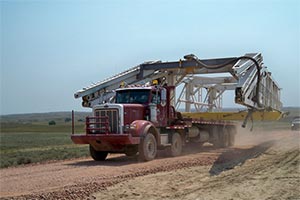Rolling With the Changes, North Dakota Trucking Companies Affected by Falling Oil Prices

Mike Bertelsen, the Dickinson, North Dakota, terminal superintendent of regional Black Hills Trucking, said his branch of the company has felt the winds of change like many others in the region.
He said there has been a “dramatic” change in the business they encounter. The company hauls far less oil rigs, pipes and other equipment to and from the field.
“The only thing that has been relatively steady is our crude hauling,” Bertelsen said.
Trucking, like other businesses in the area, has felt the impact of globally slouching oil prices. However, the effects local companies report are varied.
Bertelsen said his company has had to rein in spending and lay off drivers as a result of economic conditions, he said.
He said the branch also has lost drivers because many figured they could go back to their home areas to drive for a similar amount of pay without having to pay for the high rent in and around Dickinson.
But Bertelsen said his company now can be “a lot more choosy” in hiring for open spots due to the multitude of drivers no longer being employed by other companies in the oil field.
For now, Bertelsen said his company’s Dickinson terminal plans to watch spending and keep cutting back, and to maintain operations through the slump.
“I think we’ll survive,” he said.
The oil industry slowdown also has affected Troy Anderson Trucking, a company southeast of Dickinson owned by Troy Anderson and his father Dave.
Before the downturn, Troy Anderson said hauling aggregate materials and some pipes for the oil industry accounted for “about 55%” of his company’s total business.
Last summer, he said it likely accounted for less than 10%.
“It’s affecting us,” he said.
Fuel prices have come down, but Anderson said he was wondering why they weren’t lower. He said he had just studied what conditions were like in 2008, when he said fuel prices hit $1.54 while oil was at $90 per barrel.
Now, gas prices are averaging $1.70 while oil sells at around $30 to the barrel.
“We still haven’t matched that price per gallon versus the price per barrel,” Anderson said.
The overall price of freight has dropped as well, he said.
This summer, Anderson said his business will focus on hauling asphalt to locations around the state, though it does service nationwide.
Anderson said one effect of low oil prices is that he finds it easier to hire and keep drivers. Whereas before he said he struggled to keep enough drivers to man all the trucks, the past few months people have been waiting to be hired on.
However, Anderson said many drivers are looking to truck within the region and stay local, while the work is all either out of state or in other parts of North Dakota. He said local work basically has dried up.
“It’s hard for people,” he said. “They still want to be local drivers, but there’s not the availability to be local trucking.”
Despite the hardships that other companies might be facing due to low oil prices, TMI Systems Design Vice President Dean Rummel said his company’s trucking fleet, and business as a whole, is on the upswing.
“We’re going the other way right now,” he said.
TMI has its own trucking entity, called TMI Transport, of which Rummel also is president. This entity is solely in charge of distributing the company’s products nationwide.
Rummel said this is a more practical option for the company rather than contracting other transport services, as 80% of its business is out of state.
While all outbound cargo is TMI freight, Rummel said around half of the loads coming back are raw materials for the company. The other half are loads from other companies that TMI has contracted to bring back to North Dakota, such as goods for Menards and Coca-Cola.
Rummel explained that low fuel prices allow the company to be more competitive in bidding for projects around the nation, which he said helps when there are similar companies that are closer to project locations.
“When you drop your prices like this, we become more competitive,” he said.
Because of low fuel prices, Rummel said his business’ sales and manufacturing could grow between 20 and 30%.
He said that, because of the prospect of low fuel prices to come, his company decided to lease 11 new trucks that have a slightly better fuel economy.
Between these and prices the way they are, Rummel predicted TMI could spend up to $350,000 less within the coming year compared with years past.
“TMI is actually growing and hiring,” he said. “It is partially because of low oil prices.”




